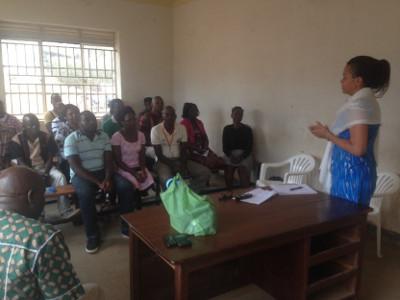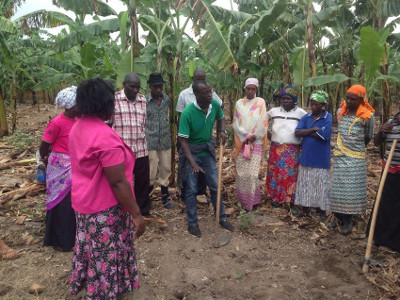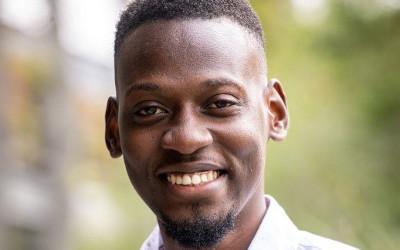Day 43, Year of #Mygration: Understanding relational dynamics between refugees and host communities in South-West Uganda

Dr Craig Walker and Dr Ben Lampert from Development, Policy and Practice (DPP) within The Open University teamed up with two Ugandan NGOs – the Pan-African Development, Education and Advocacy Programme (PADEAP), an operational partner in the settlement, and Kulika, who provide skills and technology to enhance rural communities. Together they are interested in studying the places and spaces where refugees and host communities interact on a daily basis such as markets, hospitals and schools. This will help gain understanding of how they interact and get on. Ugandans from surrounding communities will be brought together with Rwandese, Congolese and Burundian refugees to receive training on a plot of land donated by the camp authorities – creating a shared environment to learn and share skills and knowledge. The training space will then provide the research team a vehicle for examining how relationships develop to better understand what causes conflict or peace.

Kulika teaching participants to make organic compost
The International Development and Inclusive Innovation Strategic Research Area at The Open University provided some seedcorn funding for Craig and Ben to visit Oruchinga, Uganda, for the first time last September. It was designed to be a scoping trip to develop the methodology and better understand the dynamics of the settlement. As part of the visit, Kulika delivered a two day programme involving a series of small agricultural techniques to a select group from across all the nationalities to give them an idea of the type of training they can expect to receive if they participate.
Many refugees around the world are not living in fenced in, segregated settlements far removed from the population of the country that hosts them. In Uganda, many of the refugee camps are open, for example. In fact, when they were driving through the Oruchinga settlement back in September last year looking to develop a project you wouldn't even know you were in a refugee camp until you reached the small UNHCR compound base camp. It just seems like a series of small, interconnected villages.
Land provided to house refugees will often be near to local communities, so if there are no formal physical barriers around settlements it is likely that there will be contact between refugees and locals. Researchers studying the relationships and interaction between refugees and these communities have tended to focus on identifying the causes of conflict as a preventative measure to stop potential violence. The assumption is that the extra pressure and competition that an influx of refugees puts on local services and resources will generate conflict. Their research flips this belief, however, to instead consider what factors and conditions might generate peaceful and mutually beneficial relations.
What has been encouraging for them to hear since returning from the trip is that many of those who attended the training have gone on to replicate these practices at home, and even sharing with family and neighbours. Colleagues in the camp have said they have received positive comments that demonstrate both a clear need and desire for this training.
They are now in the process of bidding for RCUK funding and are looking to embed this project within a larger-scale piece across three countries. The outcome of this research will help inform governments dealing with high numbers of refugees on the benefits of promoting peaceful relations between their citizens and the refugees they are living alongside.
Dr Walker undertook his PhD with Development, Policy and Practice, looking at causes of violence after the civil wars in Nepal and Mozambique. His research focuses on the impact of post-conflict political party relations on intergroup violence and local peacebuilding processes.
Quarterly Review of Research
Read our Quarterly Review of Research to learn about our latest quality academic output.

Contact our news team
For all out of hours enquiries, please telephone +44 (0)7901 515891
Contact detailsNews & articles

Research image of the month - flood resilience, community voices, and a panoramic perspective
This month’s research image of the month (June 2025) encapsulates Claude Nsobya’s research on how communities are leading the way in managing flood risk through local knowledge and natural solutions.